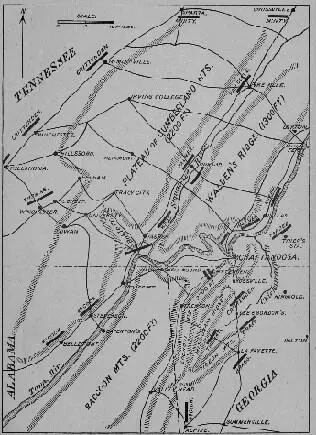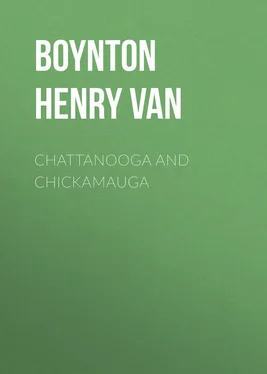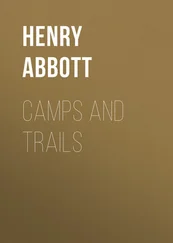Henry Boynton - Chattanooga and Chickamauga
Здесь есть возможность читать онлайн «Henry Boynton - Chattanooga and Chickamauga» — ознакомительный отрывок электронной книги совершенно бесплатно, а после прочтения отрывка купить полную версию. В некоторых случаях можно слушать аудио, скачать через торрент в формате fb2 и присутствует краткое содержание. Жанр: foreign_antique, foreign_prose, Историческая проза, на английском языке. Описание произведения, (предисловие) а так же отзывы посетителей доступны на портале библиотеки ЛибКат.
- Название:Chattanooga and Chickamauga
- Автор:
- Жанр:
- Год:неизвестен
- ISBN:нет данных
- Рейтинг книги:3 / 5. Голосов: 1
-
Избранное:Добавить в избранное
- Отзывы:
-
Ваша оценка:
- 60
- 1
- 2
- 3
- 4
- 5
Chattanooga and Chickamauga: краткое содержание, описание и аннотация
Предлагаем к чтению аннотацию, описание, краткое содержание или предисловие (зависит от того, что написал сам автор книги «Chattanooga and Chickamauga»). Если вы не нашли необходимую информацию о книге — напишите в комментариях, мы постараемся отыскать её.
Chattanooga and Chickamauga — читать онлайн ознакомительный отрывок
Ниже представлен текст книги, разбитый по страницам. Система сохранения места последней прочитанной страницы, позволяет с удобством читать онлайн бесплатно книгу «Chattanooga and Chickamauga», без необходимости каждый раз заново искать на чём Вы остановились. Поставьте закладку, и сможете в любой момент перейти на страницу, на которой закончили чтение.
Интервал:
Закладка:
Henry V. Boynton
Chattanooga and Chickamauga / Reprint of Gen. H. V. Boynton's letters to the Cincinnati Commercial Gazette, August, 1888
PREFACE
Comrades of the Society of the Army of the Cumberland:
When General H. V. Boynton's letters recently appeared in the Cincinnati Commercial Gazette , so vividly portraying the achievements and heroism of the Army of the Cumberland in its campaign for the possession of Chattanooga, including the inevitable incident thereto, the battle of Chickamauga, I thought how agreeable it would be for each member of the society to have a copy for perusal at our approaching reunion on the twenty-fifth anniversary of Chickamauga.
Accordingly I asked General Boynton's permission to print these letters in pamphlet form, as advance sheets of any volume in which he may determine to put them with other matter. To this he most cheerfully assented in the following letter:
Washington, Sept. 1, 1888.My Dear General: You are welcome to the Chickamauga letters for any use you choose to make of them. While the salient features of both days' battle are easily understood, the details of movements by brigades are in many cases intricate. For this reason various errors may have been made in the text. If those who observe them will take the trouble to correct them before the public, they would thus assist in establishing the correct history of a battle in which the Army of the Cumberland should take great pride.
Very truly yours, H. V. BOYNTON.General W. S. Rosecrans.
With this explanation, the letters are given in the order of their respective dates.
W. S. ROSECRANS.CHATTANOOGA AND CHICKAMAUGA
Washington, August 3 . [Special.] – In two preliminary letters about Chickamauga the attempt was made to describe the field as it appears to-day, and to present some of the scenes of the battle which came rushing back over the plains of memory with a power suggestive of the departed legions that once clothed these farms, forests, and ridges with the terrible magnificence of battle.
In a sense, to write of Chickamauga is to try to excite interest in a subject which far too many regard as worn; but to the veterans who fought there it will never be a threadbare story. For that generation which has been born and has come to manhood since Chattanooga was won by the Union arms, there is no campaign which can be studied with greater profit, or which will more richly repay the reader. History has not yet done justice to Chickamauga, but its verdict is sure. Many of the misconceptions of the days following the battle still exist in the popular mind. It may be years before they are cleared away; but eventually the Chickamauga campaign will stand in the history of our war as unequaled in its strategy by any other movement of the contest, and as unsurpassed, and probably not equaled, for the stubbornness and deadliness which marked the splendid fighting of Unionist and rebel alike; and, furthermore, it will stand as a substantial Union victory.
Just in proportion as the credit due is awarded to those who planned and executed the campaign will well-merited condemnation be meted out to those at Washington who insisted upon forcing the movement without regard to proper and vital preparation, who withheld re-enforcements, and who, in spite of public and private warnings which it was criminal not to heed, made rebel concentrations against Rosecrans possible from in front of Washington itself, and from Charleston, Mobile, and Mississippi.
It will be the purpose of a few letters to go over some of the well-known ground of this campaign with a view of enforcing the ideas expressed in general terms above, and attempting to present a clear account of this most involved, and still seriously misunderstood battle. The strategy – matchless in our war – which compelled Bragg to abandon Chattanooga; the life and death struggle for concentrating the Union army when Rosecrans, against the protests of Washington authorities that it could not be true, found his widely separated corps confronted with re-enforcements from every part of the Confederacy; and, lastly, the great battle in the Chickamauga forests for the possession of Chattanooga, are each most fruitful and interesting themes. The present letter will relate to the first-named subject, the strategy of the Chickamauga campaign.
Marching from Murfreesboro on the 23d of June, 1863, General Rosecrans had advanced against Bragg, who was strongly fortified, and whose lines, besides, occupied gaps and ranges of great natural strength. By brilliant strategy, with the loss of only 586 killed and wounded, and thirteen captured or missing, the Army of the Cumberland, with its nine divisions and twenty brigades, operating through sixteen days of continuous rain, maneuvered Bragg, with his seven divisions and twenty-three brigades, out of his natural and artificial strongholds, and forced him across the Tennessee. Up to that time there had been no strategic campaign to equal this, and it was soon to be far surpassed, except in the one element of loss, by the campaign to follow it. So brilliant had been the conception and the execution that all the corps commanders, headed by General Thomas, hastened to call on General Rosecrans and offer the warmest congratulations.
At the close of the Tullahoma campaign Bragg occupied Chattanooga and the mountain passes above and below it. Rosecrans's army lay along the western base of the Cumberland Mountains, its right above Winchester and its left at McMinnville. Here General Rosecrans at once began the most vigorous preparations for another campaign for the occupation of Chattanooga. Because the necessities of the case compelled secrecy as one of the main elements of success, there was soon at Washington a manifestation of unreasoning impatience over what was criticized as the inaction of the Union commander; but those who were on the ground know well the unceasing activity and energy with which the work progressed of accumulating sufficient supplies of food, material, and ammunition, preparing the means for crossing the Tennessee and obtaining the necessary knowledge of the mountain passes, roads, and trails by which the army must move. Rosecrans's supplies reached him over a badly equipped line of worn railroad, a hundred and thirteen miles in length, and, as can be readily understood, when the daily wants of a great army preparing for extended movement and battle are considered, the matter of accumulating a surplus of supplies was not the task of a day or a week. With every effort the railroad was not repaired until July 25, and the forward movement began on the 14th of August.

A glance at the map will disclose the great natural obstacles which lay between General Rosecrans and Chattanooga. As his army faced toward the latter point, the Cumberland Mountains, with a general elevation of 2,200 feet, rose before it. The escarpment was everywhere precipitous, and destitute of every means of approach except narrow mountain roads and trails, with the one exception that a short railroad ran from Cowan to Tracy City, on the summit of the range. To the eastward this range dropped by like precipitous and difficult slopes into the valley of the Sequatchee River. Beyond that stream rose the equally sharp cliffs of Walden's Ridge, with a general elevation of 1,300 feet. This fell off along the eastern and southern edge of the plateau into the valley of the Tennessee, and overlooked it from the mouth of the Sequatchee River to a point far above Chattanooga. It was fifty miles as the crow flies from the lines of Rosecrans's army across this continuous mountain region to the valley of the Tennessee. This river was broad and deep, and presented in itself the most serious natural obstacle which the Union army had encountered since it left the Ohio River. It was 2,700 feet wide at Bridgeport, and 1,254 feet at Caperton, the points where the bridges were subsequently thrown.
Читать дальшеИнтервал:
Закладка:
Похожие книги на «Chattanooga and Chickamauga»
Представляем Вашему вниманию похожие книги на «Chattanooga and Chickamauga» списком для выбора. Мы отобрали схожую по названию и смыслу литературу в надежде предоставить читателям больше вариантов отыскать новые, интересные, ещё непрочитанные произведения.
Обсуждение, отзывы о книге «Chattanooga and Chickamauga» и просто собственные мнения читателей. Оставьте ваши комментарии, напишите, что Вы думаете о произведении, его смысле или главных героях. Укажите что конкретно понравилось, а что нет, и почему Вы так считаете.












